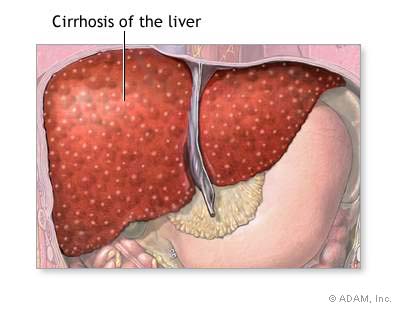
Alcohol and Liver Disease
Alcohol and Liver Disease
Liver Lines: June 23, 2011
Written by David Bernstein, MD, FACP, FACG Friday, 24 June 2011 00:00
There is a perception that alcohol is the most common cause of chronic liver disease and cirrhosis in our country. Most people in the community and even doctors believe this to be a true statement. Patient after patient who liver doctors see in their practices come in saying that they do not understand how that got liver disease as they do not drink or they only occasionally imbibe alcoholic beverages during an average month or year.
First and foremost, it is important to state that while alcohol use can cause liver damage, it does so in only the minority of people who drink and it is certainly is not the most common cause of chronic liver disease or cirrhosis. That honor goes to hepatitis C and non-alcoholic fatty liver disease, which is generally secondary to either diabetes or obesity.
So what does alcohol do to the liver? Alcohol can be a direct toxin to the liver and cause inflammation which can ultimately lead to fibrosis or scarring of the liver and even cirrhosis. It takes a lot of alcohol to do this in people without any underlying liver disease. Therefore, the overwhelming majority of people who drink responsibly do not develop alcoholic liver disease.
In fact, alcohol has been shown to have positive effects on some medical conditions and this has led cardiologists to recommend certain patients have a small glass or two of red wine each night to prevent coronary artery disease. The obvious questions are then: 1) How much alcohol is too much for the liver? and 2) Who is more likely to get in trouble with alcohol intake?
The first question has no answer as no one knows for sure. It is here that common sense must prevail. Three factors must be considered when in determining how much alcohol is too much for the liver. These factors include the amount of alcohol ingested, the type of alcohol and the size and weight of the person.
Hard liquor such as vodka, gin and scotch are more likely to cause a problem as they have higher alcohol content. People who drink more than two drinks a day seem more likely to have problems and this is not just from a liver point of view. Thin people, in particular women who in general have a smaller body mass than men, are more likely to develop liver issues if they drink the same amount of alcohol as people who have a larger body mass. For example, the effects of drinking 3 glasses of wine a day are likely to be more profound for a 100 pound person than a 200 pound person.
Who is more likely to develop liver issues with alcohol use? Anyone who drinks excessive amounts of alcohol is at risk. Drinking every day is not necessarily excessive as it depends on the quantity ingested. Weekend binge drinking may be even more dangerous than drinking small amounts every day. When patients say, “I only drink on the weekends,” this may be a sign of concern.
The other large group at risk for alcoholic liver disease is anyone with underlying liver disease, regardless of etiology. People with fatty liver or hepatitis C, for example, who drink even small amounts of alcohol, are more likely to have progression of their liver disease, as alcohol is a confounding factor leading to more rapid deposition of fibrosis. The simple rule to live by is no alcohol if underlying liver disease is present.
So what can we say about alcohol and the liver? For the most part, people who drink alcohol do not develop liver disease and, while alcohol can cause chronic liver disease, it usually only does, in those people who truly drink irresponsibly or have an underlying liver condition. As with almost everything in this world, alcohol should be used in moderation and with an understanding of the specific risks associated with its use.
Dr. Bernstein is the Director of Hepatology for the North Shore-Long Island Jewish Health System. You may write to Dr. Bernstein, c/o Anton Newspapers, 132 E. Second Street, Mineola, NY 11501 or email:dbernste@nshs.edu
(Disclaimer: The views and opinions represented are those of the author and meant for informative purposes only. For your specific questions, consult your physician.)